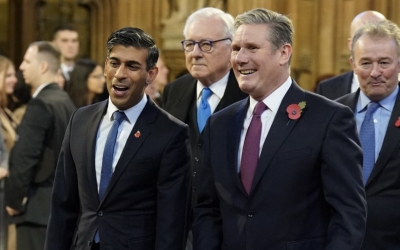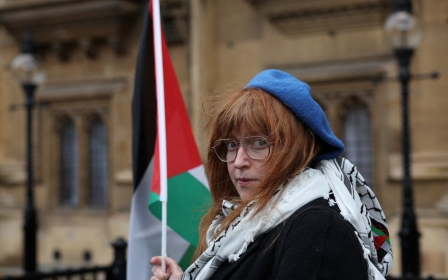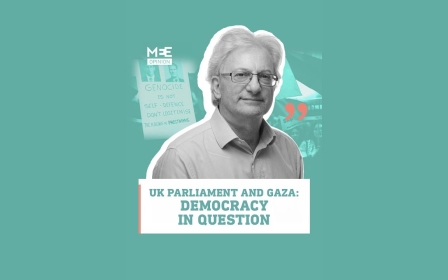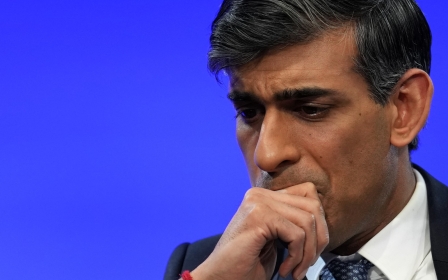War on Gaza: Why the UK is demonising pro-Palestine protesters
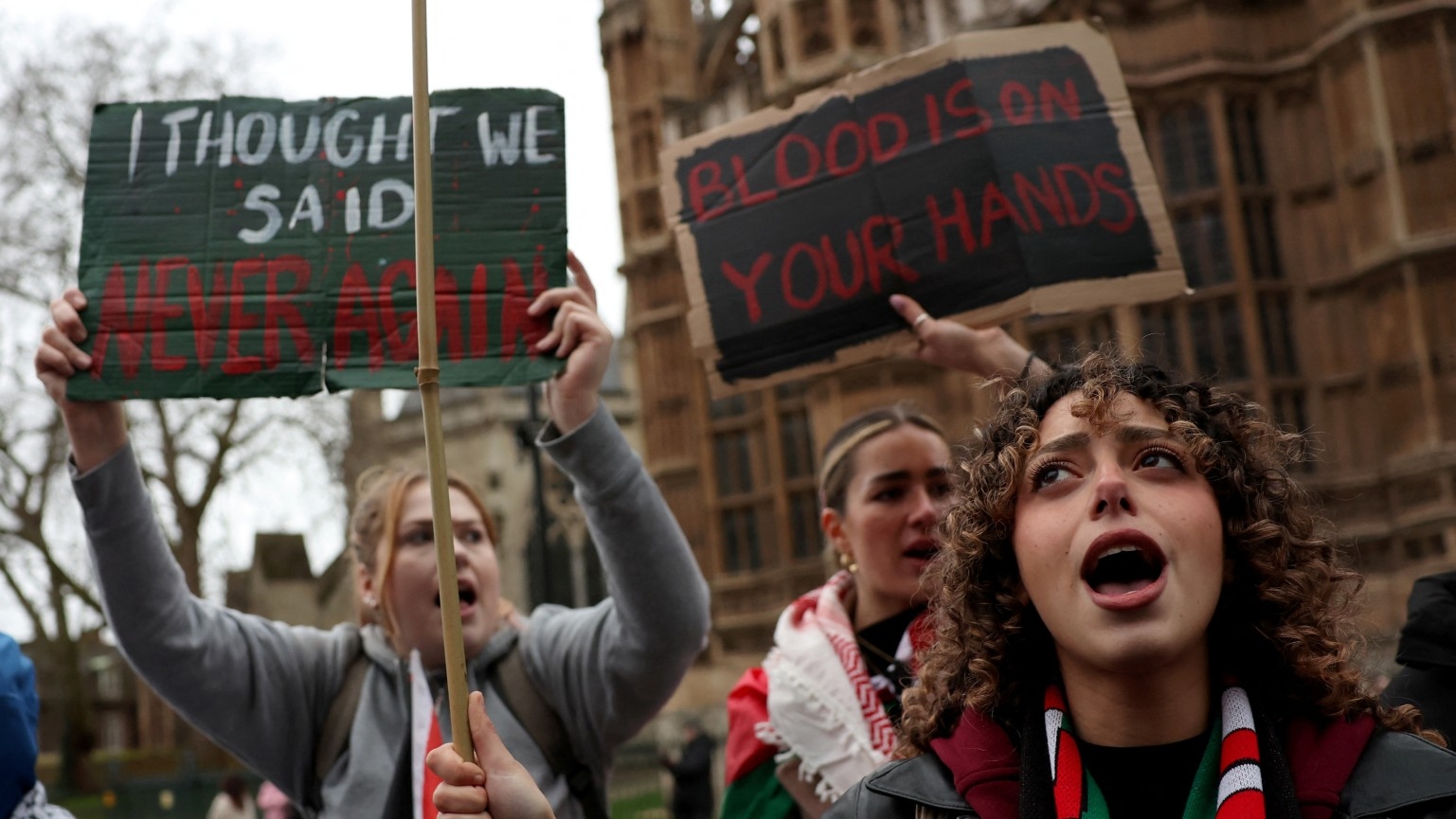
When I heard Home Secretary James Cleverly recently urging the UK’s pro-Palestine protests to stop, saying they had “made their point”, I half-expected the government to follow by announcing its support for an immediate ceasefire in Gaza.
After all, if the government had truly “gotten the point” of these regular marches - which is to stop Israel’s relentless killing of Palestinian men, women and children in Gaza, with the death toll already exceeding 30,000 - then that would be the inevitable result.
Cleverly’s dismissal of the millions of people who have marched in a bid to save a shred of the world’s humanity was evident when he questioned their “value” or what they were “seeking to achieve”. These comments are tone deaf, as if British residents were giving up their weekends for foolhardy antics, rather than calling to protect newborn babies who are starving in Gaza.
For those attending the marches, the value is clear. The protests are a way to demand change and hold power to account, with more than two-thirds of the British public supporting a ceasefire that their government refuses to back.
The value also comes from raising awareness and building solidarity among diverse, disparate and previously disconnected communities. Such connections are priceless in the long-term struggle for Palestinian human rights and freedoms. Is that why our government is trying to suppress them?
New MEE newsletter: Jerusalem Dispatch
Sign up to get the latest insights and analysis on Israel-Palestine, alongside Turkey Unpacked and other MEE newsletters
Not only are the pro-Palestine protests continuing, they are increasingly mobilising efforts to shift government policy in the UK. Just last week, anti-establishment politician George Galloway won a Rochdale by-election that was dominated by the issue of Gaza.
The government, clearly rattled, is now resorting to the classic defence of demonising its opposition as hateful and violent. Islamophobia in the UK government is nothing new, with politicians exploiting the “Muslim menace” card whenever it suits them electorally.
Reinforcing the divide
Even when such prejudice is called out, as it was in the recent case of MP Lee Anderson suggesting that London Mayor Sadiq Khan had “given the capital away” to Islamists, the consequences are paltry; Anderson lost the Conservative whip after refusing to apologise.
House of Commons Speaker Lindsay Hoyle is also facing attempts to oust him from the role after he thwarted parliamentary conventions last month to allow debate on a Labour motion on Gaza, diverting attention from an important ceasefire proposal tabled by the Scottish National Party (SNP). Members of the public had exercised their legal and legitimate rights to lobby their politicians in person ahead of the crucial ceasefire vote.
Follow Middle East Eye's live coverage of the Israel-Palestine war
After dozens of MPs signed a no-confidence motion targeting Hoyle, he blamed his conduct on “absolutely frightening” threats he said had been made against parliamentarians. Prime Minister Rishi Sunak subsequently accused Hoyle of pandering to “extremists”.
Reinforcing the divide between British politicians and members of the public on the issue of Gaza, Sunak last Friday delivered a speech outside his Downing Street office in which he ironically called “for us all to stand together to combat the forces of division”. He warned of “extremist” elements infiltrating the ranks of protesters and called for tougher policing.
The consistent response from our government has been to dismiss, denigrate and criminalise public disagreement with its policies
This came during a week when a US serviceman self-immolated in protest against his country’s support for Israel’s military campaign in Gaza, images of starving and dehydrated Palestinian children flooded our screens, and more than 115 Palestinians in Gaza City were killed while waiting to collect aid. Against this backdrop, Sunak’s dog-whistling was aptly described by Green MP Caroline Lucas as “a masterclass in gaslighting”.
In addition to a lack of evidence that protests have been hijacked by hostile forces, data from the Metropolitan Police shows that among the millions of people who have marched for Gaza in London in recent months, there had been just 153 arrests by the end of December, nearly 80 percent of which led to no charges.
Meanwhile, there have been a soaring number of attacks against Muslims and Jews in Britain since 7 October, with the hate-crime monitoring group Tell Mama recording more than 2,000 anti-Muslim incidents.
Undermining the cause
Yet, despite the evidence of systematic harm against Muslims in the UK, there has been no additional government funding allocated for their protection, even as Sunak last week pledged more than £70m ($89m) over the next four years for the protection of the Jewish community, and an additional £31m ($39m) for the protection of MPs amid “growing threats”.
While I agree that politicians’ homes shouldn’t be targeted, their workplaces literally constitute the public spaces in which debate, dissent and disagreement are meant to occur. Some protesters now rightly fear that the conflation of “extremism” with the legitimate exercise of public engagement aims to undermine their cause.
As someone who has been to every pro-ceasefire rally since October, I can attest to the significant police presence. But my experiences have been more akin to festivals than violent riots, as demonstrations have been filled with snacks, flags and music, despite the tragic cause.
Unsurprisingly, there has been a torrent of angry responses to the UK government’s seemingly wilful ignorance on the purpose or peacefulness of protests. As these protests have continued, civil liberties groups such as Amnesty International have decried Sunak’s latest remarks as “deeply worrying”.
At the same time, the human rights group Liberty has launched a legal challenge to the British government’s decision to sign off on anti-protest legislation that had been previously rejected by parliament.
Viewed through a wider lens, Sunak’s speech is part and parcel of a broader crackdown on public dissent in recent years. Whether the topic is climate, healthcare or racism, the consistent response from our government has been to dismiss, denigrate and criminalise public disagreement with its policies.
Today, the target is Palestine - but if we continue to allow our legitimate concerns for global safety and humanity to be demonised, and our rights to advocate for them curtailed, then who knows what tools we will have left to fight tomorrow’s injustices.
The views expressed in this article belong to the author and do not necessarily reflect the editorial policy of Middle East Eye.
Middle East Eye delivers independent and unrivalled coverage and analysis of the Middle East, North Africa and beyond. To learn more about republishing this content and the associated fees, please fill out this form. More about MEE can be found here.



